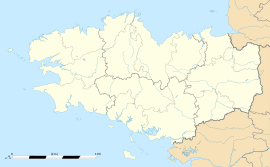Perros-Guirec
Perros-Guirec
Perroz-Gireg | |
|---|---|
 The Côte de Granit Rose and the Ploumanac'h lighthouse, in Perros-Guirec | |
| Coordinates: 48°48′51″N 3°26′32″W / 48.8142°N 3.4422°W | |
| Country | France |
| Region | Brittany |
| Department | Côtes-d'Armor |
| Arrondissement | Lannion |
| Canton | Perros-Guirec |
| Government | |
| • Mayor (2014–2020) | Erven Léon |
| Area 1 | 14.16 km2 (5.47 sq mi) |
| Population (2021)[1] | 7,175 |
| • Density | 510/km2 (1,300/sq mi) |
| Time zone | UTC+01:00 (CET) |
| • Summer (DST) | UTC+02:00 (CEST) |
| INSEE/Postal code | 22168 /22700 |
| Elevation | 0–96 m (0–315 ft) |
| 1 French Land Register data, which excludes lakes, ponds, glaciers > 1 km2 (0.386 sq mi or 247 acres) and river estuaries. | |
Perros-Guirec (pronounced [pɛ.ʁos ɡi.ʁɛk]; Breton: Perroz-Gireg) is a commune in the Côtes-d'Armor department in Brittany in northwestern France. It has been a chic but discreet and family seaside resort since the end of the 19th Century.
Population
| Year | Pop. | ±% |
|---|---|---|
| 1793 | 1,738 | — |
| 1800 | 1,477 | −15.0% |
| 1806 | 1,783 | +20.7% |
| 1821 | 1,968 | +10.4% |
| 1831 | 2,251 | +14.4% |
| 1836 | 2,366 | +5.1% |
| 1841 | 2,368 | +0.1% |
| 1846 | 2,555 | +7.9% |
| 1851 | 2,605 | +2.0% |
| 1856 | 2,635 | +1.2% |
| 1861 | 2,765 | +4.9% |
| 1866 | 2,800 | +1.3% |
| 1872 | 2,761 | −1.4% |
| 1876 | 2,778 | +0.6% |
| 1881 | 2,920 | +5.1% |
| 1886 | 2,713 | −7.1% |
| 1891 | 2,614 | −3.6% |
| 1896 | 2,809 | +7.5% |
| 1901 | 2,991 | +6.5% |
| 1906 | 3,395 | +13.5% |
| 1911 | 3,488 | +2.7% |
| 1921 | 3,633 | +4.2% |
| 1926 | 4,078 | +12.2% |
| 1931 | 4,432 | +8.7% |
| 1936 | 4,605 | +3.9% |
| 1946 | 5,812 | +26.2% |
| 1954 | 5,231 | −10.0% |
| 1962 | 6,020 | +15.1% |
| 1968 | 6,866 | +14.1% |
| 1975 | 7,773 | +13.2% |
| 1982 | 7,496 | −3.6% |
| 1990 | 7,497 | +0.0% |
| 1999 | 7,614 | +1.6% |
| 2008 | 7,297 | −4.2% |
Inhabitants of Perros-Guirec are called Perrosiens in French.
Breton language
In 2008, 4.79% of primary school children attended bilingual schools.[2]
Tourism
Perros-Guirec is a popular seaside resort, with fine sandy beaches and various opportunities for water and beach sports. It is known for its pink granite rocks which have been sculpted by the sea into varied shapes and patterns. There are three large sandy beaches suitable for families: Trestraou beach is popular for swimming, sunbathing as well as surfing, as it is sheltered and receives full sunshine; Trestrignel beach is wilder and more exposed to the wind; Saint-Guirec beach is smaller and even more picturesque with the presence of the Costaeres Castle on its island in front of it.
Perros-Guirec is known to hold many stunning seafront villas and manors, many of which are built with pink granite extracted locally.


Economy
Perros-Guirec's economy is largely based on tourism but benefits also from its proximity to Lannion technopole. The nearby Grand Isle, separated from the mainland by a narrow channel, was once famous for its granite quarrying industry. The rock was transported from the island by boat, and was used in the construction of many imposing buildings in Paris.
International relations
Perros-Guirec is twinned with :
 Teignmouth in Devon in the southwest of England.[3]
Teignmouth in Devon in the southwest of England.[3] Barr, Bas-Rhin, France
Barr, Bas-Rhin, France Quintin, France
Quintin, France
Personalities
Perros-Guirec was long attended by men of letters and artists, for instance the painter Maurice Denis, owner of a villa in Trestrignel ("Never the nature seemed to me more beautiful than in Perros"), writers Anatole Le Braz, Charles Le Goffic, or Ernest Renan who was behind the idea of the construction of the Grand Hotel in Trestraou, to name a few. Joseph Conrad lived here for several years and wrote many of his most famous maritime books during that period.
Cultural references
Perros-Guirec is where, in Gaston Leroux's The Phantom of the Opera, a teenage Vicomte de Chagny retrieves young Christine Daaé's scarf from the sea.[4] It is also the final resting place of her father.
See also
- Communes of the Côtes-d'Armor department
- Jentilez (Sept-Îles)
- Ploumanac'h Lighthouse
- Sept-Îles Lighthouse
References
- ^ "Populations légales 2021" (in French). The National Institute of Statistics and Economic Studies. 28 December 2023.
- ^ (in French) Ofis ar Brezhoneg: Enseignement bilingue
- ^ "Welcome to Teignmouth Twinning Online". teigntwin.co.uk. Archived from the original on 2008-05-01. Retrieved 2008-01-19.
- ^ Chauls, Robert; Robinette, Joseph (1992). The Phantom of the Opera: Based Upon the Novel by Gaston Leroux. Dramatic Publishing. p. 30. ISBN 978-0-87129-173-8.
External links
- INSEE
- Official website (in French)
- French Ministry of Culture list for Perros-Guirec (in French)




